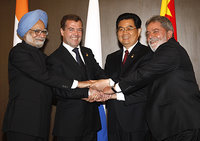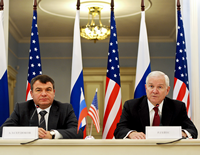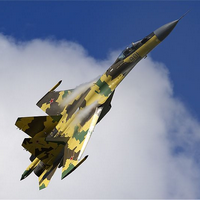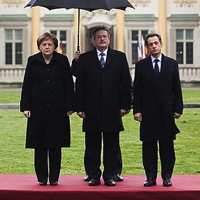Europe’s leaders are voicing increasing concern that unrest in North Africa and the Middle East will cause a surge of illegal immigration to the continent. And with current European Union laws placing the onus of dealing with immigrants on the country where they land, the possibility of a surge has some more on edge than others. Italy, for instance, says it shouldn’t be left to “bear the brunt of the new arrivals just because it is so close to North Africa,” according to this New York Times story about the country’s present scramble to house people evacuated from Lampedusa, a […]
Europe Archive
Free Newsletter
Russia and India recently announced that they are cooperating on developing joint liquefied natural gas projects. In an email interview, Jörg Himmelreich, a senior fellow at the German Marshall Fund of the United States, discussed energy relations between Russia and India. WPR: Historically, what has been the energy relationship between Russia and India? Jörg Himmelreich: India and Russia have a formal strategic partnership dating back to the Cold War, when they were each other’s single most important partner. Even after the demise of the Soviet Union, they enjoyed traditionally good relations, although the resulting fundamental shift in the global order […]
India and the European Union have reportedly hit a snag in their long-running negotiations over a free trade agreement, hoped to boost bilateral trade by nearly $30 billion. Initially slated for signature in early April, the agreement now appears to have been postponed until 2012. One of the key sticking points in the negotiations is a proposal to enhance intellectual property protections for medicine. India has a thriving generic drug industry. It did not allow patents on pharmaceutical products until 2005, when it adapted its laws to conform with the World Trade Organization’s intellectual property rules. Products produced prior to […]
Turkish Cypriots held protests in Nicosia recently in opposition to austerity measures being imposed by Ankara on the Turkey-supported territory. In an email interview, Mehmet Hasgüler, an expert on Turkish international relations at the International Strategic Research Organization and Çanakkale Onsekiz Mart University, discussed relations between Turkey and Turkish Cyprus. WPR: Why have tensions risen between Turkey and Turkish Cyprus in recent months? Mehmet Hasgüler: As a matter of fact, tension has always been a part of the relations between Turkey and Turkish Cyprus. A decade ago, Turkish Cypriot grievances toward the Turkish government erupted into a series of demonstrations […]

The U.S.-led intervention in Libya is now in full swing, thanks to a 10-0 vote by the U.N. Security Council in favor of authorizing military force. But the seeming unanimity of the vote belies key abstentions from a wary Germany as well as Brazil, Russia, India and China — the four emerging economic powers known as the BRICs. The BRICs’ abstentions raise difficult questions about the future of a rules-based international order at a time of relative U.S. decline. The BRICs’ move seemed to be grounded in their longtime allergy to Western-led military operations. Couched in language of humanitarian concern, […]
Amid all the criticism of the U.S. and coalition military intervention in Libya, one strain in particular has focused on the role played by France and President Nicolas Sarkozy in leading the charge toward action. In his typically thorough fashion, Art Goldhammer does a great job of explaining both the personal and political factors behind Sarkozy’s zeal. As Goldhammer mentions, there is the thirst for glory, the appetite for risk, the desire to make up for flubbing Tunisia and receiving Gadhafi on a state visit to Paris in December 2007, as well as the potential boost a global leadership role […]
A number of attempts to create alternatives to the U.S. Global Positioning System are underway. Russia is close to completing its GLONASS system, which India plans to join, while China is working on developing its own system. In an email interview, Charles Vick, senior technical and policy analyst for GlobalSecurity.org, discussed global satellite navigation systems. WPR: What countries are currently pursuing a global navigation satellite system (GNSS) capability and what is the status of their programs? Charles Vick: The Global Positioning System (GPS), the global navigation system developed by the U.S., remains the primary system used by both the military […]
Portugal’s failure to pass an austerity plan and slash its budget deficit led Prime Minister Jose Socrates to resign yesterday and appears to put the country on an accelerated track toward a European Union-funded bailout package. Concerns are rising that this could lead to a bailout “domino effect,” with the Los Angeles Times reporting that “if Portugal needs a bailout, investors may begin to bet that struggling Spain will follow.” A wider question involves Europe’s ability to sustain so many bailouts in the long term. But the EU may not have much choice, according to World Politics Review contributor Daniel […]

Robert Gates has just completed his first and perhaps his last trip to Russia as secretary of defense under President Barack Obama. Although the two-day visit produced little of substance, some of Gates’ public reflections help us understand how much the Russian-U.S. military relationship has improved during the last few years. As expected, much of the media coverage concerned Russia’s response to the military intervention in Libya led by the U.S., Britain and France. The apparent split between Prime Minister Vladimir Putin, who denounced the intervention as a “crusade,” and President Dmitry Medvedev, who mildly rebuked his erstwhile boss, attracted […]
Belgium recently surpassed Iraq to become the country that has gone longest without forming a government, after elections in June 2010 handed a plurality to a Flemish separatist party. In an email interview, Dave Sinardet, professor of political science at the Free University of Brussels and the University of Antwerp, discussed Belgium’s long-running political crisis. WPR: Why have tensions between Wallonia and Flanders become so pronounced in recent years? Dave Sinardet: Three key elements can help to explain the complex political crisis in Belgium. First, there is a structural element: the absence of national political parties. All parties are either […]
In addition to spreading across the region, the Arab uprisings are inspiring peaceful demonstrations away from the Middle East — perhaps most notably, albeit with little international news coverage, in the former Soviet bloc country of Armenia. More than 10,000 anti-government protesters rallied last week in the capital, Yerevan, where according to the Associated Press, opposition leader and former President Levon Ter-Petrosian claimed the demonstration was inspired by the revolts in the Arab world. Outcry has mounted since Serzh Sargsyan, a former prime minister, became the nation’s third president in a disputed 2008 election, the immediate aftermath of which was […]
Pulling back for a second from the debate over whether the U.S. should intervene in Libya, the process by which the actual international response unfolded is cause for optimism. Among the big-puzzle pieces that shifted, I see the following: – The U.S. as “law-abiding” global actor. President Barack Obama has already taken hits for indecisiveness and worse, but the fact that the administration held firm on multilateral mandates highlights its commitment to a multipartner world. – France and Britain as European security guarantors in the Mediterranean and Northern Africa. It remains to be seen how involved NATO will become in […]

The Russian government recently announced its goals for Russia’s rearmament, with a shopping list that includes 100 ships, 600 airplanes, and 1,000 helicopters over the course of the coming decade. Although these figures make for spectacular headlines, they give a misleading impression of the extent of Russia’s likely military buildup. First Deputy Defense Minister Vladimir Popovkin, who is in charge of arms procurement, confirmed that the Ministry of Defense (MOD) envisages spending roughly $650 billion from 2011-2020 for its new State Armaments Program (SAP), which also includes more than $100 billion for the other Russian security services outside the MOD. […]
I had the pleasure of taking part in France 24’s panel discussion program, The World This Week, on Friday. The other guests were Matthew Saltmarsh of the IHT, Billie O’Kadameri of Radio France International and Simon Kuper of Financial Times. The discussion focused on events in Libya, but we also covered Ivory Coast and the resignations of former French Foreign Minister Michele Alliot-Marie and former German Defense Minister Karl-Theodore zu Guttenberg. Part one can be found here. Part two can be found here. I recommend the discussion on Libya in particular, because Billie O’Kadameri offered some very useful insights into […]

At a time of serious budgetary restrictions and painful austerity measures, Europe must reassess its political ambitions and ratchet up its efforts to reverse negative trends in its global influence. With this in mind, Warsaw has increasingly sought to revitalize close coordination between Poland, France and Germany in what is known as the Weimar Triangle. That initiative has taken on greater urgency in anticipation of Poland assuming the rotating European Union presidency in July 2011. However, the most recent Weimar Triangle Summit, held in Poland in early February, confirmed that when it comes to Europe, Warsaw, Berlin and Paris have […]
Russia, Iran and Azerbaijan recently signed a series of railway agreements aimed at implementing the North-South Transport Corridor, including constructing rail links to connect the Iranian cities of Qazvin, Rasht and Astara. In an e-mail interview, Taleh Ziyadov, a doctoral fellow at Cambridge University, and Regine A. Spector, a visiting research fellow at the Woodrow Wilson Center’s Kennan Institute, discussed transport cooperation among Russia, Iran and Azerbaijan. WPR: How extensive are the existing transportation links among the three countries? Taleh Ziyadov and Regine A. Spector: Azerbaijan and Russia are connected by railroad and by a recently constructed modern highway linking […]
